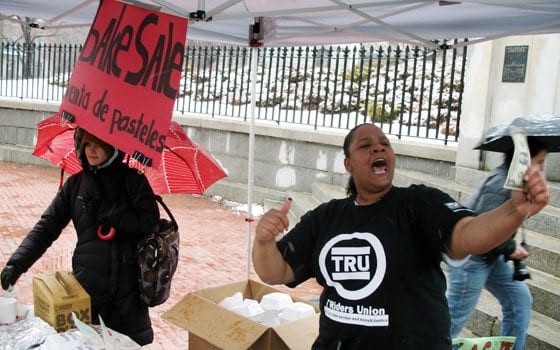
When the Massachusetts Bay Transportation Authority’s (MBTA) board of directors meets Thursday afternoon, the agency will be $194 richer, thanks to a bake sale held by the T Riders Union.
The funds were raised as part of a publicity event the group staged, along with the Massachusetts Public Interest Research Group (MassPIRG), the On the Move Coalition and other organizations, to dramatize the MBTA’s need for more revenue. While the sum is insignificant in the face of the MBTA’s $8 billion debt and $165 million budget deficit, the event sent an important message, according to Massachusetts Secretary of Transportation James Aloisi.
“We need more than a bake sale,” Aloisi said after addressing activists and reporters gathered in front of the State House for the event. “We’re asking people to support the governor’s gas tax.”
Aloisi predicted that without Gov. Deval Patrick’s proposed 19-cent increase in the state gas tax, the MBTA will have to raise fares by as much as 25 percent, cut weekend and evening service by 50 percent and eliminate 20 bus routes. Nine communities would also be in danger of losing the MBTA’s RIDE service, which provides door-to-door transportation for disabled Massachusetts residents who can’t use other public transit options, by the July 1 start of the next fiscal year.
Patrick has been touring Massachusetts to drum up support for the gas tax hike, but the measure has garnered widespread opposition, including attacks from Democratic lawmakers.
State Sen. Steven Baddour, a Methuen Democrat, a co-chairman of the Legislature’s Joint Committee on Transportation, has said he would not support an increase in the gas tax until the state’s transportation system is reformed. Patrick has proposed restructure the existing system, consolidating agencies and eliminating the Massachusetts Turnpike Authority.
Under the governor’s proposal, the majority of the funds raised by the gas tax would go toward the maintenance and debts on the state’s highways and bridges. Six cents of the tax increase would go to the MBTA.
Without the tax increase, Patrick administration officials say they will have to increase tolls along Interstate Highway 90 and in the airport tunnels.
It’s the MBTA fare increases, though, that brought on Monday’s bake sale and brought out Cathedral High School sophomore Charelle Ball, who said many families couldn’t afford an increase to the $20 that students are charged for monthly T passes.
“It’s a lot for kids to pay,” she said. “Some parents have more than one kid in high school. Some kids end up walking. I’ve seen some kids not go to school because they don’t have money for a bus pass.”
Marvin Martin, executive director of the Greater Four Corners Action Coalition, said fare increases would hit hardest the people who are most dependent on the MBTA.
“If you look at who rides the buses most, it’s low-wage earners,” he said. “If you make $8 an hour, a fare increase is a huge burden on you.”
Patrick’s proposed gas tax increase may face resistance from legislators whose districts do not include state highways, or have MBTA or locally-based public transportation.
But T Riders Union Program Director Lee Matsueda said an investment in the MBTA is an investment in the state.
“The MBTA is not just essential because of its riders, but also because the economy in the Greater Boston area is dependent on people being able to get to jobs,” Matsueda said. “In this metro area are 50 percent of the jobs in the state and 70 percent of the people.”







